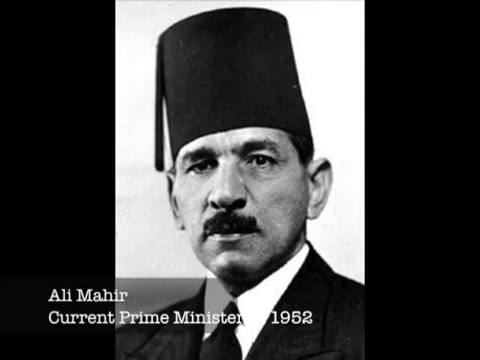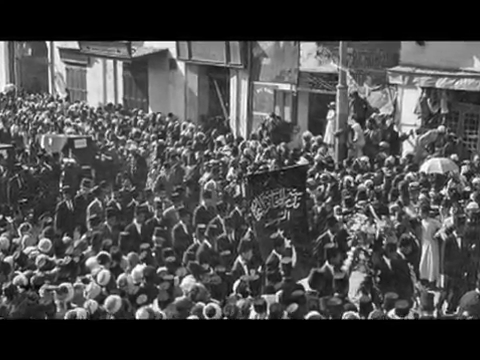The Revolution Of 1952
Revolution Starts
The origins of the Egyptian army takeover of July 1952 lay in the long British domination of Egypt and the inability of the Egyptian monarchy to end British domination. Britain - had occupied Egypt in 1882 in order to collect debts by Egyptians to European financiers and to ensure the security of Suez Canal communications between Britain and British India.

In spite of the British occupation, Egypt remained nominally a Turkish province, until the First World War when it became a British Protectorate in name as well as in fact.
The 1936 Anglo-Egyptian Agreement ended Britain's military occupation of the heart of the country, but allowed Britain to retain the right to station troops in the Suez Canal Zone. In the Second World War Egypt sunk to the level of a British military base and Cairo became the headquarters of the British Eighth Army fighting the Afrika Korps of the brilliant German General Rommel.
 Egyptian
resentment of British domination reached, its height in 1942 when Rommel's
advance from the western desert towards the lower Nile encouraged pro-Axis
sentiment. Rommel offered to the Egyptians a chance to break the stranglehold
Britain had had over their country for 60 years - though it is doubtful if they
weighed accurately the disadvantages of a German rather than a British
occupation during the Nazi era. Anwar al-Sadat, a revolutionary young army
officer, actually made contact with Rommel's headquarters; but this was
discovered and Sadat spent the rest of the war in a British prison camp.
Egyptian
resentment of British domination reached, its height in 1942 when Rommel's
advance from the western desert towards the lower Nile encouraged pro-Axis
sentiment. Rommel offered to the Egyptians a chance to break the stranglehold
Britain had had over their country for 60 years - though it is doubtful if they
weighed accurately the disadvantages of a German rather than a British
occupation during the Nazi era. Anwar al-Sadat, a revolutionary young army
officer, actually made contact with Rommel's headquarters; but this was
discovered and Sadat spent the rest of the war in a British prison camp.
British tanks surrounded King Farouk's palace and forced him to appoint as Prime Minister not the favoured candidate, the pro-Axis and popular Ali Maher, but the pro-British leader of the Wafd nationalist party, Nahas Pasha. Besides, the British defeated Rommel at El Alamein.
 The
post-war period from 1945 was marked by rampant corruption and conspicuous
spending by King Farouk and his family and by the Wafd leaders. The Wafd had
come to represent the wealthy families of Egypt and did nothing to reduce the
gap between the rich and the poor in the country. If anything, the post-war
Wafd governments widened the existing gap in wealth between the class of large
landowners and the fellahin (peasants owning tiny smallholdings or no land at
all).
The
post-war period from 1945 was marked by rampant corruption and conspicuous
spending by King Farouk and his family and by the Wafd leaders. The Wafd had
come to represent the wealthy families of Egypt and did nothing to reduce the
gap between the rich and the poor in the country. If anything, the post-war
Wafd governments widened the existing gap in wealth between the class of large
landowners and the fellahin (peasants owning tiny smallholdings or no land at
all).
After 1945 more and more fellahin found themselves unable to make a living for themselves and to feed their families by cultivating their own land. Many sold up to large landowners and went to work for the latter on their larger estates. By 1952 as few as 6 per cent of Egypt's landowners owned as much as 65 per cent of the cultivated area.
 Growing
opposition to Farouk's regime was spearheaded by the radical nationalist but
traditionalist Muslim Brotherhood led by Sheikh Hassan el-Banna, and by the
radical nationalist but modernist Free Officers, a group of secret conspirators
in the army increasingly under the control of the cool-headed Nasser rather
than the impetuous Sadat. The Free Officers were determined to effect a
revolution after the Egyptian army was badly let down by the government in the
Palestine War of 1948-9, when Egypt fought alongside other Arab states in a
vain attempt to destroy the newly-created state of Israel.
Growing
opposition to Farouk's regime was spearheaded by the radical nationalist but
traditionalist Muslim Brotherhood led by Sheikh Hassan el-Banna, and by the
radical nationalist but modernist Free Officers, a group of secret conspirators
in the army increasingly under the control of the cool-headed Nasser rather
than the impetuous Sadat. The Free Officers were determined to effect a
revolution after the Egyptian army was badly let down by the government in the
Palestine War of 1948-9, when Egypt fought alongside other Arab states in a
vain attempt to destroy the newly-created state of Israel.

ANWAR SADAT, his peace with Israel engendered his assassination.
The Free Officers fought bravely. Some were killed and many were wounded. Major Nasser survived a bullet close to the heart, and distinguished himself by leading a skilful counter- attack in the Faluga pocket 20 miles north-east of Gaza, thus preventing the Israelis over-running Faluga.
But the Free Officers could never forgive the political and administrative incompetence of the government which supplied them with outdated arms and only irregularly with food and military supplies. Colonel Ahmed Abdul Aziz before he was killed reminded his colleagues, 'Remember that the real battle is in Egypt.'
After the Palestine debacle the Wafd government tried desperately to win popularity at home by pursuing an anti-British policy. In October 1951 Nahas announced the unilateral abrogation of the 1936 treaty. British forces in the Canal Zone were subjected to guerilla attacks and sabotage and their food supplies were cut off. Neither Nahas nor the Egyptian people seriously expected these measures would lead to a British evacuation of the canal. When the British responded by the assault on the police headquarters in the city of Ismailia on 25 January 1952, which left 43 policemen dead, the Egyptian public blamed their government for defeat and the throwing away of lives.
 After
riots in Cairo Nahas was dismissed by Farouk and replaced at last by Ali Maher.
But it was too late to shore up the ramshackle structure of Farouk's regime.
The Free Officers, led by Nasser, were ready to move.
After
riots in Cairo Nahas was dismissed by Farouk and replaced at last by Ali Maher.
But it was too late to shore up the ramshackle structure of Farouk's regime.
The Free Officers, led by Nasser, were ready to move.
National Movements and New States in Africa